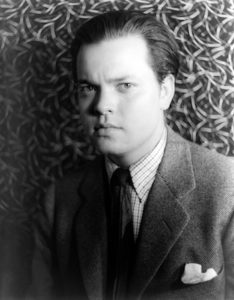
Orson Welles, 1937
*Orson Welles was born on this date in 1915. He was a white-American director, actor, screenwriter, and producer.
George Orson Welles was born in Kenosha, Wisconsin. He was the son of Richard Head Welles and Beatrice Ives Welles. His parents separated and moved to Chicago in 1919. His father, who made a fortune as an inventor, became an alcoholic and stopped working. Welles's mother, a pianist, played during lectures by Dudley Crafts Watson at the Art Institute of Chicago to support her son and herself; the oldest Welles boy, "Dickie", was institutionalized at an early age because he had learning difficulties. Beatrice died of hepatitis on May 10, 1924, just after Welles's ninth birthday.
After his mother's death, Welles ceased pursuing music. He would spend the summer with the Watson family at a private art colony in the Finger Lakes Region of New York. Then, in what Welles later described as "a hectic period" in his life, he lived in a Chicago apartment with his father and Maurice Bernstein, a Chicago physician who had been a close friend of both his parents. Welles briefly attended public school before his alcoholic father left the business and took him along on his travels to Jamaica and the Far East. When they returned, they settled in a hotel in Grand Detour, Illinois, owned by his father. When the hotel burned down, Welles and his father took to the road again for three years.
He began working with Franklin Roosevelt's New Deal program at twenty. This theater work included the Works Progress Administration and the Federal Theatre Project. The Federal Theatre Project was the ideal environment where Welles could develop his art. John Houseman, director of the Negro Theatre Unit in New York, invited Welles. The company for the first production, an adaptation of William Shakespeare's Macbeth with an entirely Black cast, numbered 150. The play opened on April 14, 1936, at the Lafayette Theatre in Harlem and was received rapturously. The production then made a 4,000-mile national tour.
In 1938, the radio anthology series The Mercury Theatre on the Air gave Welles the platform to find international fame as the director and narrator of a radio adaptation of the novel The War of the Worlds, which rocketed 23-year-old Welles to notoriety. His first film was Citizen Kane (1941). While waiting for Citizen Kane to be released, Welles produced and directed the original Broadway production of Native Son, a drama written by Paul Green and Richard Wright based on Wright's novel. Starring Canada Lee, the show ran from March 24 to June 28, 1941. The Mercury Production was the last time Welles and Houseman worked together. Welles released twelve other features.
His distinctive directorial style featured layered and nonlinear narrative forms, dramatic lighting, unusual camera angles, sound techniques borrowed from radio, deep-focus shots, and long takes. He was a lifelong lover of Shakespeare. Welles was an outsider to the studio system and struggled for creative control of his projects early on with the major film studios in Hollywood and later in life with various independent financiers across Europe, where he spent most of his career.
On the evening of October 9, 1985, Welles recorded his final interview on the syndicated TV program. Welles returned to his house in Hollywood and worked into the early hours typing stage directions for the project he and Gary Graver were planning to shoot at UCLA the following day. Orson Welles died sometime on the morning of October 10, 1985, following a heart attack. With a development spanning almost 50 years, Welles's final film, The Other Side of the Wind, was posthumously released in 2018. Welles was married three times and had three children. He performed extensively across theatre, radio, and film. He was a lifelong magician. In 2002, directors and critics voted him the greatest film director in two British Film Institute polls. In 2018, he was included in the list of the 50 greatest Hollywood actors of all time by The Daily Telegraph.